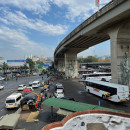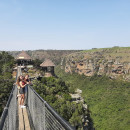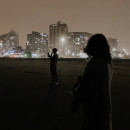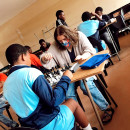An Unbeatable Semester in South Africa Past Review
By Olivia B (University of Puget Sound) - abroad from 09/04/2021 to 12/17/2021 with
SIT Study Abroad: South Africa - Social and Political Transformation
This was the most worthwhile thing I’ve ever done! I gained a whole new world view and international connections that I plan to utilize as I apply for jobs after graduating from University. I learned so much about the inner workings of South Africa and post colonial politics. The program also taught me so much about the United States and my own positions within the world.
Review Photos




Personal Information
| How much international exposure did you have prior to this program? | 0-2 weeks |
Review Your Program
|
* Overall educational experience
Academic rigor, intensity, resources, etc. |
I honestly felt like I learned more in the first two weeks of this program than I do in a semester of traditional school. This learning in this program is based more on excursions and working with local NGO’s than traditional lecture based lessons, and it was incredible! The resources of this program are unbelievable and I was able to meet with people like Mac Maharaj, Ela Ghandi, Albie Sachs, and MK veterans. This program has mastered experiential learning and the lessons and excursions we took changed my life. |
|
* Host Country Program Administration
On-site administration of your program |
The program has been running for decades and is smooth rolling at this point. The staff is incredible and forming relationships with them provides students with so many high caliber positions and connections. Even though the program runs smoothly and has superb administration, there’s always something exciting. The excursion to Maputo, Mozambique is challenging but so informative and memorable, it was one of my favorite aspects of my semester abroad. |
|
* Housing:
How satisfied were you with your living arrangements? |
I was abroad during COVID so my experience was different than normal but still great! Usually students do 3 different homestays, but I lived in a beach side apartment since COVID didn’t allow us to live in close quarters with South African families. I was able to be apart of a rural homestay where I stayed with a Sangoma, a transitional South African healer. The relationships I built with her, her daughter, and grand daughters, will last the rest of my life. I’m still in contact with them and the rural homestay is what I miss most about my experience. Even though I was able to do the other homestays we were put up at an apartment that was right on the beach and had easy access to the city. Whether you’re able to do a homestay or not, you can be sure the program will place you in a safe an enriching environment. |
| * Food: |
Once again COVID affected my experience in this sense a bit, but the food was incredible! Rather than having a lot of home cooked meals like I would have with homestays I explored a lot of restaurants, and the food served there was top notch. Travel doctors often say it isn’t safe to eat fresh fruits or vegetables while abroad, but really trust me, you can. Buying fresh fruit from food vendors is a must and the fresh produce d there is perfectly safe to eat. Through my rural homestay and internship position I was also able to eat some traditional Zulu food which was incredible. The best part about this was learning how to make things like Phutu and Chakalaka with my host family. |
|
* Social & Cultural Integration:
How integrated did you feel with the local culture? |
Everyone in South Africa is so kind, welcoming, and helpful. I didn’t have any negative cultural experiences. Learning Zulu was so fun and the local people are so thrilled to see foreigners learning their language. They love to speak to you and teach you new words and critique your pronunciation. As long as you’re willing to engage with people they will treat you with immense kindness. The people are the thing I miss most about my time abroad and this program will give you opportunities to engage with Zulu culture that many traditional study abroad programs won’t be able to provide. |
|
* Health Care:
How well were health issues addressed during the program? |
I didn’t have any healthcare related incidents but the program has a wonderful doctor they work closely with who is easily accessible and makes medications like malaria prophylaxis and prep easily accessible to students. |
| * Safety: |
If you’re looking at studying abroad in South Africa you’ve probably had many people ask “why?” and tell you that it isn’t safe. Honestly, my family didn’t want me to go to Durban because they believed it was very unsafe. The program does a great safety orientation and I never felt unsafe. South Africa is the most unequal society in the world so the rate of petty theft is high, but if you stay alert while in the city you will be totally safe. The program gives all the safety tips you need and the people of Durban are wonderful and kind to visitors. |
| If you could do it all over again would you choose the same program? |
Yes
I wouldn’t change a thing if I had the opportunity to make this decisions again. Studying abroad in Europe is a great thing to do and for some people it’s definitely the right move, but if you’re looking for something new, exciting, and genuinely life changing, I would urge you to look at a program in Africa. My best friend studied abroad in Paris while I was in Durban and our experiences were very different, and I would chose mine every time! One morning after I had taken a basin bath at my rural homestay I hoped on Instagram and saw him skiing in Chamonix. That moment it really hit me that I had made the right decision. Solo travel in Europe and many parts of Asia is pretty doable with some planning, but if I hadn’t participated in this program I would have never stayed with a traditional healer in and experienced life in rural South Africa. I wouldn’t have met high profile Anti-Apartheid activists and I would have never worked at a school in a township, providing historically disadvantaged students with the tools to access higher education. This program gave me once in a lifetime opportunities that have changed my world view and my plans for the future. Intense programs like this teach you so much about yourself and I cannot recommend this South African program enough. |
Finances
|
* Money: How easily were you able to live on a student's budget?
(1 = not very easy/$200+ on food & personal expenses/week, 2.5 = $100/week, 5 = very easily/minimal cost) |
The program provides a meal stipend that covers everything you will need. Students are often able to save on this stipend and use the extra money to travel around South Africa or surrounding countries after the program ends. I relied solely on the stipend for food and didn’t have any worried. You can travel here on a tight budget because the US dollar is worth much more than the rand so your money will go a long ways even if you only have a small amount. |
| Not including program expenses, about how much money did you spend on food and other expenses each week? | $20 or less |
Language
| * Did your program have a foreign language component? | Yes |
|
How much did the program encourage you to use the language?
0 = No encouragement, 5 = frequent encouragement to use the language |
Always use Zulu! Markets are so fun and the vendors will love you for trying to speak their language! Zulu was such a blast and I’m still trying to learn from home! |
| How would you rate your language skills at the beginning of the program? | None |
| How would you rate your language skills at the end of the program? | Beginner |
| What was the highest level language course you had completed prior to departure? | I took Spanish prior to departure, I didn’t use it in South Africa! |
| How many hours per day did you use the language? | |
| Do you have any tips/advice on the best ways to practice the language for future study abroad participants? | Practice with your classmates, homestay families, and anyone you meet around Durban! It can be waiters, Uber drivers, vendors, sand artists, it doesn’t matter, everyone is so excited to see Americans learning Zulu. |
Other Program Information
|
* Where did you live?
Select all that apply |
|
|
* Who did you live with?
Select all that apply |
|
|
* Who did you take classes with?
Select all that apply |
|
| About how many local friends did you make that you will likely keep in touch with? |
A Look Back
| * What did you like most about the program? |
|
| * What could be improved? |
|
| * What do you know now that you wish you knew before going on this program? | I wish I knew that South Africa really isn’t as dangerous as people say. It’s a complex place that has a dark history that still lingers, but the people are so vibrant and full of passion, it’s an amazing place. I’m considering moving to Durban and working there. At least I will go back and visit everyone there because they’ve changed my life and not a day goes by where I dont think about them. |
Reasons For Studying Abroad
| To help future students find programs attended by like-minded individuals, please choose the profile that most closely represents you. |
The Nearly Native or Trail BlazerCraving the most authentic experience possible, perhaps you lived with a host family or really got in good with the locals. You may have felt confined by your program requirements and group excursions. Instead, you'd have preferred to plan your own trips, even skipping class to conduct your own 'field work.' |








